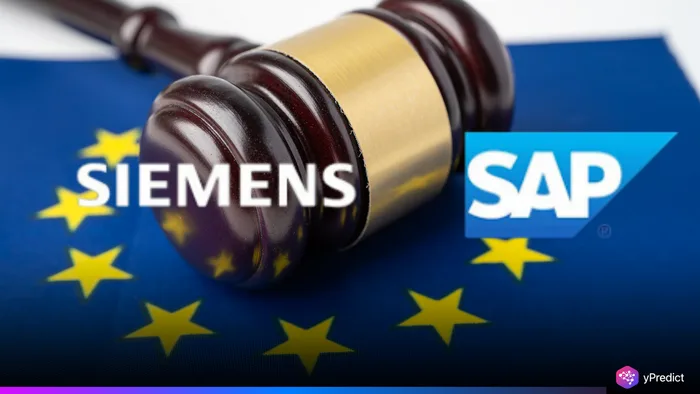
Europe’s push to regulate artificial intelligence faces new resistance from two of Germany’s biggest tech leaders. Siemens CEO Roland Busch and SAP CEO Christian Klein are now urging the European Union to revise its current AI legislation. They argue that overly complex and restrictive laws are preventing the continent from fully unlocking its innovation potential.
Their criticism extends not just to artificial intelligence but to the entire digital framework in Europe. They believe the combination of strict AI laws and the recently enacted Data Act is creating a regulatory maze that slows progress. Instead of enabling a digital future, these regulations, they argue, are acting like roadblocks to both AI development and effective use of data resources.
EU AI Act Faces Fresh Scrutiny from Industry Giants
The EU AI Act, which came into force last year, is designed to make artificial intelligence safe, ethical, and transparent. It assigns AI systems into risk categories and enforces obligations accordingly. While it intends to protect users and maintain standards, critics say it is overreaching and slowing technological advancement.
Roland Busch claims the overlapping nature of the EU AI Act and the EU’s Data Act has made it difficult for companies to build effective digital business models. “These laws contradict each other at times and stifle progress,” he said. Busch specifically called the Data Act “toxic” for digital growth, arguing that it discourages innovation in Europe rather than encouraging it.
Siemens and SAP Reject One-Size-Fits-All Approach
Busch and Klein emphasize that Europe needs its digital strategy instead of mimicking the U.S. model, which focuses on heavy investment in infrastructure and data centers. While some companies, including Meta and Alphabet, have written to Brussels requesting a delay in implementing the rules, Siemens chose not to join that letter. Busch felt their concerns didn’t go deep enough.
Christian Klein added that Europe’s main challenge isn’t infrastructure or servers but the strict regulatory framework around data. He warned that pouring billions into data centers won’t solve anything unless data laws are fixed first. “We’re sitting on a treasure trove of data in Europe, but we can’t even access it effectively,” Klein said.
Why Data Rules Reform Must Come First
The CEOs concur on the need for Europe to remove existing legal resource constraints around data before investing in advanced computing resources. The existing legal climate prevents companies from fully deploying consumer and corporate data when there is a chance that it could result in new innovation and new efficiencies.
They say if data rules are reformed to give flexibility to companies to then extract value from existing data stores, there would be a great deal more innovation produced. The better the rules, the smarter the law, the more than Europe could be a leader in the development of AI, while continuing to put safety and risk management around users.
Conclusion
The key points are clear from Siemens and SAP: Europe must re-evaluate its priorities. Regulations must shield people, but should never hold back tech progress. By amending the EU’s AI regulations and scrapping transformed data laws, Europe can provide its citizens and businesses with what they deserve-globally competitive outcomes.
Busch and Klein believe less regulation and more collaboration between policymakers and industry will provide the pathway forward for Europe. They are even on record saying that they don’t oppose regulation, but they want smart regulation that unshackles innovation and supports productivity.






